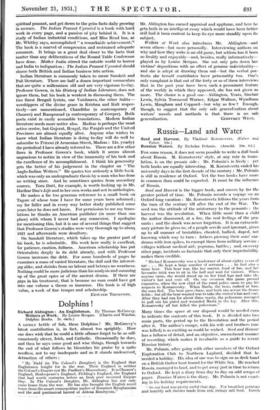Dolphins !
A LIVELY kettle of fish, these Dolphins I Mr. McGreevy's latest contribution is, in fact, almost too sprightly. How one does wish that he could a little oftener-forget to be so self- consciously clever, Irish, and Catholic. Occasionally he does, and then he says some good and wise things, though towards the end of what follows he blemishes his praise by a quite needless, not to say inadequate and as it stands undeserved, detraction of others :
" Mr. 'Judd (in The Colonel's Daughter) is the England that Englishmen fought for in the war. Their England is neither the Colonel's Empire nor Mr. Purfleet's Bloomsbury. It is Chaucei's England, Shakespeare's England, Fielding's England, the England that had worth centuries before an Irish peer invented Empire Day. In The Colonel's Daughter, Mr. Aldington has not only come home from the war. He has also brought the English novel home from the smart cosmopolitan malice of Somerset Maughamism and the and puritanical hatred of Aldous Huxleyism."
Mr. Aldington has earned appraisal and applause, and here he gets both in an intelligent essay which would have been better still had it been content to keep its eye more steadily upon its subject.
Writeis at Work also introduces Mr. Aldington—and seven others—but more personally. Interviewing authors on why and how they write is an old game, but seldom has it been so freshly and enjoyably—and, besides, really informatively— played as by Louise Morgan. She not only gets down her vietims''.depositions with an effect of genuine individuality— and she is adept at drawing them out—but the verbal por- traits she herself contributes have personality too. One's only complaint is that out of the forty or so of these interviews that in the past year have been such a prominent feature of the weekly in which they appeared, she has not given us more. The choice is a good one—Aldington, Yeats, Sinclair Lewis, Sylvia Townsend Warner, Edgar Wallace, Wyndham Lewis, Maugham and Coppard—but why. so few ? Enough, though, to suggest that the only safe generalization about writers' moods and methods is that there is no safe
































































 Previous page
Previous page